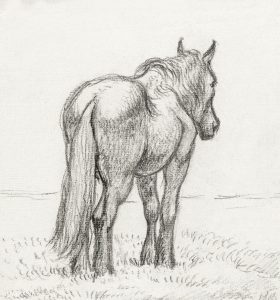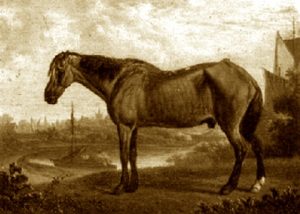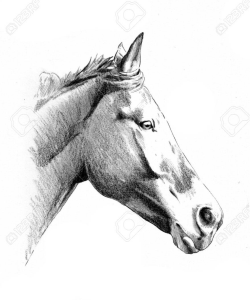Editor’s Note: I wrote this piece years ago, while I was living in Maine and owned Phoenix, a broodmare Paint originally from Massachusetts. With winter coming, we thought it would be an important conversation to have with our readers as they may be contemplating the same difficult decision. Have courage and please share your thoughts, Maddy Butcher
 Part I
Part I
Phoenix, my lovely Paint, is 30. I adopted her five years ago.
This year, it’s been an increasing challenge to keep weight on her and take care of her within my means. Giving her every supplement on the planet and swaddling her with constant care are not feasible options.
I write about putting her down, better known as euthanasia, knowing there will be plenty of critics with suggestions for better feed and better care. There will be people who will tell me I’m cruel. Then, others will call for the immediate “gift” of euthanasia.
It runs the gamut.
Mine, like any other, is a personal journey and dilemma. But the other night, as I came in teary-eyed from the barn, I realized writing about it and putting it out there for discussion was something I should do. We’re a community. So, with a box of Kleenex and a cooling cup of coffee, here goes:
With compromised teeth, Phoenix quids most of her hay and grass. Three times a day, she gets a tub of soaked beet pulp and alfalfa pellets added to her complete senior feed and Cocosoya oil. She gets forage, too.
Most days, she will stand in her stall while the others are out grazing.
This past month, I’ve noticed her hanging her head low for long periods of time. When we pony across the way to pasture, she’s slower and slower. Sometimes I leave her home because I think she’d rather not make the effort.

Old Billy, by artist Charles Towne
Give her more grain.
Give her more forage.
Give her more supplements.
Give her something for her elderly aches and pains.
I could do all that and quadruple my costs.
But to what end?
I don’t think she’s having much fun anymore.
I think about winter. Do I want to put her through it?
When is the When?
Sometimes the quality-of-life question is an easy call. The suffering is obvious, with no good end in sight. But what about Phoenix?
If it weren’t for my care, she wouldn’t have lived this long. Do I re-up my efforts? How long is too long?
If I choose euthanasia, am I doing her a favor? I went to a funeral recently and the son of the deceased praised his mother for the clear wishes she put down on paper before her unexpected stroke. When it came time to disconnect life support systems, there was no question of what she wanted.
“It’s never easy,” he said. “But with those documents in front of us, it took our self-doubt away. In essence, it had been her decision, not ours. We knew we were doing the right thing.”
If only I could sit down with Phoenix and plan for the end.
 So maybe you bring in outside voices and ask for opinions. But who are they to have the answer? If they agree with you, are they right? In the end, it’s still a personal call. We do the best we can. We try to be good leaders.
So maybe you bring in outside voices and ask for opinions. But who are they to have the answer? If they agree with you, are they right? In the end, it’s still a personal call. We do the best we can. We try to be good leaders.
In the wild, of course, there would be no mercy. The herd would have dealt with it one way or another, by leaving her behind, by bullying her further into starvation, etc.
I see these behaviors in micro-scale at my barn:
I used to feed Phoenix out in the open with her barn mates. She had a curled lip for anyone who dared come close when she ate. Not anymore. Phoenix’s status has dropped from Number 1 to Number 3 out of 4 and I close her in a stall so she can eat in peace.
A domestic horse’s life depends on chance and circumstance with one owner or another, with one culture and class of care or another. How well a horse does, how healthy she stays, how long she lives aren’t things she can control.
We make the difference between happy, productive lives or sedentary, unhealthy ones. We can make the difference between life and death.
That’s the heavy blessing of horse ownership.
Listen to Vess Quinlan recite “Where the Ponies Come to Drink”